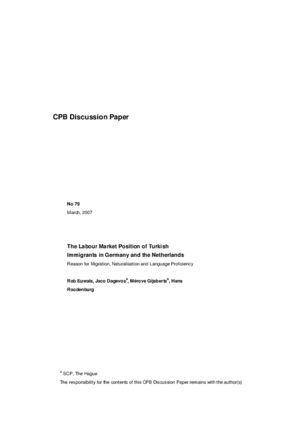The labour market position of Turkish immigrants in Germany and the Netherlands; reason for migration, naturalisation and language proficiency
We use regression techniques to correct for composition effects in employment rates, tenured job rates and job prestige scores (ISEI). First, we find that educational attainment and language proficiency have a higher return in the Netherlands than in Germany. Second, we find that second generation immigrants have improved their labour market position relative to the first generation of labour migrants and their partners. The improvement is largely due to an improvement in educational attainment and language proficiency.
Third, for the Netherlands we find a positive relation between naturalisation and labour market position, while for Germany we find a negative relation with tenured employment. The contrasting results on tenured employment may be explained partly by differences in immigration rules. In Germany, economic self-reliance is more important than in the Netherlands, and this may lead to a stronger incentive to naturalise for workers with a temporary contract.

